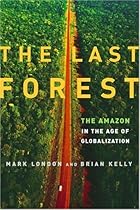In anticipation of the next World Wilderness Congress we've been covering South America a fair bit recently and we expect this to increase as we get closer to the event.
Tim Hirsch, the former BBC Environment Correspondent - now writing and broadcasting for a broader set of A-list outlets (and also consulting) - recently attended this years most important conservation event in South America. He kindly took time out to answer a few of our questions - and also gave us a more personal insight into the deliberations as he lives and works in a forest deeply affected by biodiversity loss:
• You recently attended the Latin American Consultation towards a possible International Mechanism for Scientific Expertise on Biodiversity in Bariloche, Argentina. Sounds quite a mouthful, what`s it got to do with protecting wilderness areas?
Well, potentially quite a lot. The problem is that there is no powerful scientific body to warn the world's decision-makers about the consequences of continuing to let species go extinct at the fastest rate since the demise of the dinosaurs. Contrast this with the Intergovernmental Panel on Climate Change (IPCC) which has played a pivotal role in mobilising action against global warming, however inadequate it might be. So the scientific community, in this case in Latin America, is being sounded out on what kind of new body might do the same thing for biodiversity and lead to more sensible decisions.
• Another talking shop, in other words?Fair point. The scientists at this meeting in Bariloche were absolutely clear that the last thing they wanted was another bureaucratic structure holding lots of conferences and clocking up vast quantities of frequent flier miles (and carbon emissions). But they were keen on the idea of a "network of networks" or "metanetwork"as some are describing it -- a way of bringing together the vast amount of science being done on ecosystems around the world, and making it available to governments, businesses and anyone else who needs to know the consequences of policies on the biodiversity that underpins the planet`s life support systems.
• You live in the Atlantic Rainforest of Brazil -- did you take away any thoughts from this meeting that could affect the future of this ecosystem?Only the urgency of improving the knowledge of society about the consequences of undervaluing ecosystems. The Atlantic Forest has a greater variety of species, hectare for hectare, even than the Amazon itself, and has lost some 93 per cent of its original cover (the Amazon has lost around 15 per cent). That makes it officially a "biodiversity hotspot", but what does that mean to a farmer deciding whether or not to clear just another hectare to expand his banana plantation? If this new scientific body does its job properly, it will help to strengthen the case for keeping that hectare of forest because of its role in regulating rainfall, providing pollinators for crops, creating potential for ecotourism and research into medicinal plants, etc etc. All of which is a darn site more valuable than a few extra bananas in an oversupplied market.
• You document your daily encounters with flora and fauna at your farm through your Nature Notes blog - Could you tell us a little bit more about that?I started doing it because being lucky enough to have a grandstand view of one of the most vibrant ecosystems on earth, I get a bit obsessed with every little change I notice when I look out of my bedroom window or go for a walk in the forest. Sometimes the conversations my partner and I have are a bit like a biodiversity soap opera -- "hey can you believe that lapwing is still sitting on her eggs after nearly a month? I think that saffron toucanet is trying to muscle in on the yellow-fronted woodpeckers ...." So I am keeping this record partly to share with other people around the world who may be interested, but also to act as a reminder for future reference which species are doing what at particular times of year.
• Reading suggestions?For an introduction to the concept of "ecosystem services" and the link between nature and human well-being, see this document, or for a more specific example, the Caribbean Sea Ecosystem Assessment (PDF). For an official account of the Bariloche meeting, see http://www.iisd.ca/ymb/imoseb5/
Thanks Tim!
Do also check out the
great photos Tim has on his site. If you'd like a closer look at the biodiversity of the Atlantic Rainforest, then why not consider
staying at the farm - We've been there and we can highly recommend it. As Tim says: "it can be a base for an activity-packed family holiday; a peaceful retreat from which to write, work or meditate (with Wi-Fi access!); a destination for researchers, birdwatchers or study groups; or a "chill-out zone" from a hectic business trip to Latin America."
Further South American/World Wilderness Congress reading:Previous in this series:
 Head over to the New York Times Review of Books to find a nuanced (and critical) review by John Terborgh of the new book The Last Forest: The Amazon in the Age of Globalization - Here's a brief extract from the review to whet your appetite:
Head over to the New York Times Review of Books to find a nuanced (and critical) review by John Terborgh of the new book The Last Forest: The Amazon in the Age of Globalization - Here's a brief extract from the review to whet your appetite:








